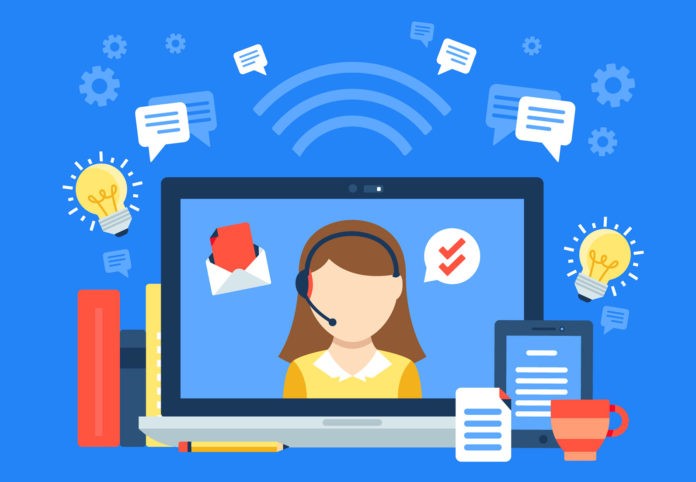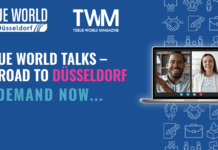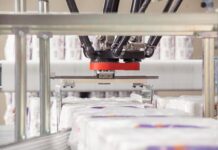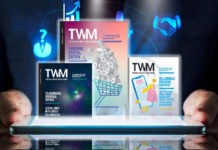Industry leaders discuss the phenomenal response to demand, drivers to innovation, remote working, increased online security risks, health and economic security, and building trust in our products.

issue World Magazine’s first ever live panel discussion webinar was shared by more than 500 industry personnel from tissue-linked companies across the globe. A total of 858 had registered to share the industry intelligence on offer, which discussed how companies were responding to these unprecedented times, and how the pandemic has accelerated the pace of change across the tissue industry.
Four expert speakers discussed the future of the tissue business model, its response to the substantial increase in demand for tissue following the outbreak of Covid-19, as well as cyber-security, BLM, home-working, and SKU simplification.
The format was designed to create focussed “chat show”-style sessions inviting anyone involved in the tissue making business to participate – from raw material suppliers, producers, converters, jumbo roll suppliers, all machinery suppliers, retailers and distributors.
The speakers were: Kim Underhill, Group President, Kimberly-Clark North America; Udaiyan Jatar, Founder, Blue Earth Network, USA; Brian J. Allen, Cyber Advisory Services, EY, USA; and Ivo Kool, senior product development manager, tissue, paper, nonwovens, Sam’s Club, USA. Moderator: Jonathan Roberts, Industry Consultant, Pryor Roberts Communications, UK.
Key questions discussed included:
- How the tissue business is responding to the outbreak of Covid-19;
- Re-thinking the office environment and home working: how companies have adapted to engage with their employees and customers;
- What are the most significant supply chain challenges;
- Vulnerabilities that the virus has exposed in terms of cyber-security;
- ‘Necessity is the mother of invention’;
- What transformations does the future hold in the wake of Covid-19 in termsof consumer behaviour, trends andbusiness operations?
TWM would like to thank all those thatparticipated in the discussion.
We look forward to bringing the tissue industry more live debate on the key topics important to you over the coming months. Below, we summarise the key points raised.
“There are three big areas that have been especially challenging. First, the safety of our people and keeping our mills running. We quickly implemented social distancing, masks and temperature checks at the beginning of each shift, because we knew we needed to keep operations running and keep our people and their families safe.
“The second challenge was the unprecedented demand. Suddenly, something that we took for granted was something you couldn’t imagine living without. Demand escalated very fast and the challenge was how to make more product quickly. It wasn’t just Kimberly-Clark; the whole industry was tested, and we can still see signs of that.
“The last challenge was how we worked with our retail partners. When you have this sudden surge of demand it really tests the supply chain and opens cracks. The supply chain had never seen such an unprecedented consumer demand which opened a lot of challenges, but also opportunities.
“On the positive side, this crisis has given us an opportunity to accelerate changes
we have wanted to do for a very long time. Internally, SKU management is very important. One thing we’ve learned which will be a lasting impact is SKU simplification. In some of our businesses we’ve cut SKU’s
by over 70%, and that has meant a 15-20% improvement in capacity. That is unrealised capacity that now sits in our system. The demand was so high that we were forced to make difficult choices. Now that we’re on this side of the crisis, we learned those choices weren’t so bad after all and I see that as a mindset-shift going forward.
“I think this is a great opportunity for the tissue world to not only think about our products today, but where we can innovate products that allow all of us to really gain confidence in protecting ourselves, our family and our environments more than ever before. Companies that can invent in this space and create a point of differentiation with real tangible, clinical evidence that you can prevent germs. I think that’s going to be a significant opportunity for the tissue industry.
“Another positive outcome is rethinking the way we work moving forward. Employees want more flexibility and to work when they want and where they want. I believe the former emphasis on visibility and hours in the office is completely reframed by this whole experience.
“Now, we’re much more focused on the outcomes of our business and how people are adjusting to working from home and learning how to balance multiple responsibilities. In the future, the Kimberly- Clark North America teams will have much more flexible working arrangements. We don’t know exactly what that means just yet, but we’ll never go back to the way we were before Covid-19.”
“The pandemic has raised big questions – a paradox for many working people – between health-security and economic- security. Several global companies have done a good job of building empathy and trust with employers and consumers in this context.
“This trust-building has helped them bring back people, consumers and or employees, back to their stores or offices. Trust building is critical if you want people to put their lives in your hands – so they know you will not be cavalier with their safety or their livelihoods.
“The pandemic has disproportionately affected the poor, and in America, black people are bearing the brunt of the crisis. We have seen some companies combining their Covid response with their responses to the Black Lives Matter (BLM) movement, because they are related in terms of the systemic change that society needs.
“There is a greater need now, more than ever, to take real action beyond pretty words, and the best companies are really taking action. It’s an opportunity for companies to actively seek to find and attract the best diverse talent into the industry.
“Smaller companies have a real opportunity to really re-examine their role in the community, product development and innovation more than ever before and look at it through the lens of the future.
People now expect more transparency and justice throughout the value chain. They expect a future with more health and sanitation. The crisis has accelerated some investors’ awakening to the fact that taking a longer-term view of things can lead to more transformative outcomes.
“It’s an opportunity for visionary leaders to take a more long-term view towards how they invest in break-through innovation, and really change systems for the future.”
Positive outcomes from the crisis: “There is an awakening to the failures that have affected our economy and society, even before the crisis. For example, the short term-ism in management culture.
“From a tactical standpoint there is an appreciation for working-from-home. People are recognising that working-from-home saves on commuting and unnecessary meetings. There’s actually a surprising resilience in our human ability to connect online, through video conferencing and collaboration tools.
“We have seen that in our workshops with remote teams: if done right, it means you have to listen to people one at a time, so more voices are given air time, and more ideas are being debated.
“That’s a really subtle but important factor. It helps breakthrough ideas. On an online format it becomes easier for these expressions to come forward.”
“In terms of the kinds of security issues companies and employees were facing during this new period of working remotely, we’ve definitely seen a ballooning of threats, which is fairly typical when criminals see a fresh opportunity. And it’s coming from organised crime and different state actors. We are all working in a different environment and the biggest weaknesses we’re seeing is employees not being aware of threats.
“One, we have to recognise we are working in a different environment. Two, the actors are very sophisticated. They are getting very good at their game. We’re seeing very complicated phishing scams that are exploiting different vulnerabilities — they are selling personal protective equipment, they are offering advice from WHO and doctors, they are exploiting e-commerce.
“Security firms are keeping executives better informed about these risks so they can find the right balance between risk and reward, and can better manoeuvre in this new environment,” he noted. “But that information about risks needs to be more timely and more in-depth.
“For the future, I think we’ll see a more holistic approach. Rather than looking
at risk management as different silos, such as crisis management, information security, or business security, we’re seeing a lot of alignment in risk practice to be more coordinated as we move through digitalisation.”
“From the beginning of March, we got hit by an unprecedented bout of purchases. From then until the end of April, the purchases almost doubled and then slowly went down to about half.
“So our issue was that as we sell a premium TAD product for bath tissue and towel, we are very committed to what our member’s want and we were not going to change that product.
“Our vendors worked with us and we managed to hit capacity. We have a very efficient team of merchants and replenishment.
“The merchants scrambled to get brands and our replenishment people were unbelievable, we went from delivery into the club to manually ordering and manually saying where product had to go to maintain supply evenly through our whole system.
“We would get a delivery and the product would be gone in an hour or two because people would get on the phone and say: “Hey, it’s in town!” And off everyone would go and buy it. One of the biggest issues raised is when people replenish tissue supplies.
“For our private brand business, our vendors pulled out all the stops. We’re levelling out now, but it was unbelievable what we went through.”
Q&A: Ivo Kool

Q/1: Do you see the Covid crisis accelerating the USA trend to private brands?
“If Private Brands are the same quality as the premium private brands then the private brands will continue to grow relative to brands. Covid may be speeding this trend up as people try whatever is available.”
Q/2: In this increasingly online purchasing environment, how do you balance price versus quality in tissue paper? Will there be any changes?
“Our private brand is high quality for an ultra-premium product at a reasonable price. Online has to solve issue with shipping costs for such a bulky package.”
Q/3: Does sustainability playa role in selecting recycled fibre vs virgin fibre in consumer vs business markets?
“The pulp used in our private brand products are certified for sustainable forestry. Northwest US Hemlock and Western Canada NBSK is primarily made with sawmill waste. Hardwood is a fast rotation plantation grown wood.
“Availability of high quality office waste may be an issue after Covid as many office paper machines have be curtailed in the last three months and probably will be converted to run other grades. Work-from- Home seems to be here to stay.
“We have seen the major copy paper producers taking major curtailment. I am not sure if a non-integrated mill making office papers can be cost competitive.Finding a relatively clean waste stream to supply recycled tissue machines making white grades will be an issue. Bleaching OCC may be possible but that tends to be a softwood product with little hardwood and those mills run Kappa’s well above 100 (bleached pulp is normally in the 30 Kappa range).”




























